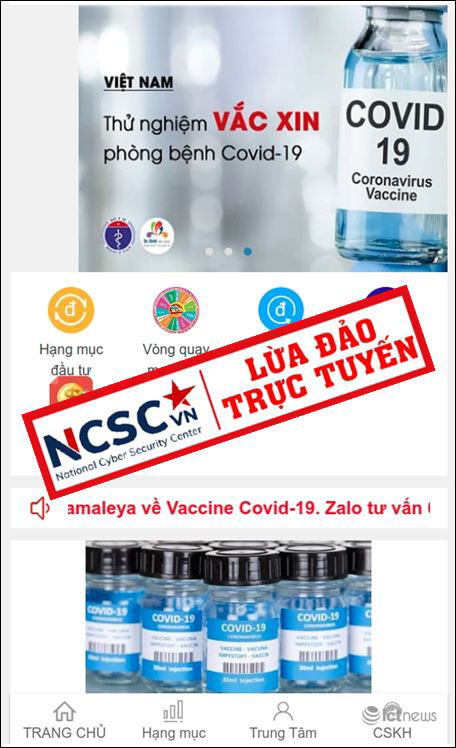Hanoi, Ho Chi Minh City and many provinces and cities are applying social distancing under Directive 16. People are to stay at home and only go out when it's really necessary, non-essential services must temporarily stop operating... In this situation, online shopping activities have blossomed. Many people look for information about necessities and medical services.
NCSC experts point out some new tricks, such as falsifying information of medical organizations, fake websites related to Covid-19, scams related to retail essentials, charity activities, investment activities, and more.
Specifically, criminals pretend to be employees of domestic or international health organizations, such as the Central Institute of Hygiene and Epidemiology of Vietnam, the Centers for Disease Control and Prevention, or the World Health Organization (WHO) to send emails to users with attachments, or links to fake content with updates on the Covid-19 situation. When opening attachments or clicking on such links, the user's computer will be attacked by malicious code or their personal information, and credit card information may be exposed or stolen.
Another new type of fraud that has emerged is fake Covid-19 related website. As observed by NCSC experts, many Internet domain names with the word "Covid" have been registered.
The scammers also use tricks related to the treatment of diseases. They use social networks and online forums to advertise many products that pretend to be able to prevent Covid-19, unproven remedies. They also disguise themselves as doctors and medical workers who had treated the victim's friends or relatives for Covid-19 and as the victim to pay fees for the treatment.

For example, they impersonate big brands and send strange links with information about gifts, winning prizes, etc. to the victim to cheat them. Many Facebook users recently received a message with the link "Adidas 100th anniversary - click to receive gifts”; and a message calling for participation in the Coca-Cola Welfare Fund.In addition to new forms of scams with the common nature of taking advantage of the fear of health, according to NCSC experts, many people have been deceived by cyber criminals who used financial benefits to appropriate the victim’s property.
Phishing related to charity activities is also a form used by many cyber criminals. They lure people to donate to fraudulent charity funds or to the development of vaccines or give away free masks impregnated with anesthetic to the victims...
Fraud investment is another type of scam. Scammers usually promise investors that they will receive high returns when investing in companies providing products or services related to Covid-19 prevention, testing and treatment.
Scammers also call for victims to invest in online investment floors to earn extreme interest, with commitment of no risk or very low investment risk, and fixed rate return.
Scammers also create mobile apps that look at first glance like popular apps used to track the spread of the Covid-19 epidemic. However, when users download to their phone, they will be attacked by malicious code and lose personal information, security information or bank/credit card details.
According to NCSC experts, to prevent online fraud, users can send fraudulent or suspected phishing links to https://canhbao.ncsc.gov.vn. NCSC will coordinate with the relevant authorities to handle it to limit online fraud.
